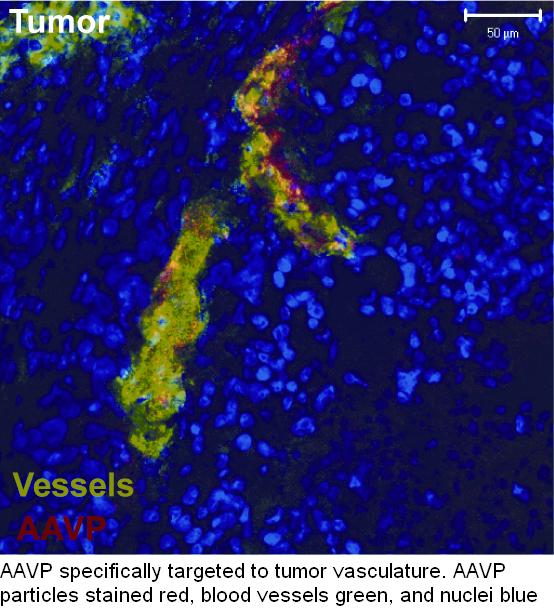|
Mouse Studies Show Gene Therapy Method Holds Promise in Targeting Tumor Blood Vessels for Destruction Cancer researchers have reported the development of a novel method for delivering a therapeutic gene specifically to the blood vessels of tumors in mice. Once delivered, the gene produces a protein that damages the blood vessels and disrupts the blood flow to tumors but not to the surrounding tissue. These experimental model results are encouraging, because the researchers' method may be safer and cause fewer side effects than alternative methods for delivering the protein to tumors. The study, led by researchers at the National Cancer Institute (NCI), part of the National Institutes of Health (NIH), and The University of Texas M.D. Anderson Cancer Center in Houston, appeared online December 17, 2008, and will appear in print in the January 1, 2009, issue of Cancer.
Blood vessels supply tumors with oxygen and nutrients that they need to grow and spread to other parts of the body. Tumor necrosis factor-alpha (TNF-a), a protein produced by immune cells, has been shown to inhibit the growth of tumors by causing damage to their blood vessels. Since TNF-a can also damage the blood vessels of noncancerous tissues, systemic administration of the protein through the bloodstream can cause severe side effects.
Currently, TNF-a is used to treat human melanomas and sarcomas in patients' limbs or organs by isolating the blood vessels that supply the limb or organ from the rest of the body's circulatory system. This therapeutic approach produces local toxicity but little systemic toxicity. Since most tumors are located in other areas of the body where this approach cannot be used, the research team, led by Steven K. Libutti, M.D., and Anita Tandle, Ph.D., of NCI's Center for Cancer Research, in collaboration with Renata Pasqualini, Ph.D., and Wadih Arap, M.D., of M.D. Anderson, developed a novel gene therapy method that allowed them to target the delivery of TNF-a to tumor blood vessels and avoid damage to noncancerous tissues.

In gene therapy, a vector is used to carry a gene to a target cell or tissue. Once the gene is delivered, it is turned on, or expressed, and a protein is produced. In their study, the research team found that a vector known as an adeno-associated virus phage vector (AAVP) could effectively deliver the TNF-a gene to the blood vessels of human melanoma tumors in mice. AAVP is a hybrid vector that is made from a bacterial virus called a bacteriophage that normally infects only bacteria, and an adeno-associated virus that infects humans and some other primate species. Bacteriophage-based vectors have a long history of safe delivery to humans. The bacteriophage was engineered to target and infect specific mammalian cells, namely tumor blood vessel cells, by altering the expression of their surface proteins. Adeno-associated virus elements improved gene delivery.
Four days after the researchers injected AAVP vectors that contained the TNF-a gene into the tail vein of tumor-bearing mice, they detected TNF-a in the human tumor tissues. During the study, the tumors became smaller and the number of blood vessels decreased, which is a sign of damage to the tumor vasculature, the network of vessels supplying blood to the tumor. The researchers did not detect TNF-a or the targeted vector in noncancerous tissues of the mice, including the heart, lung, kidney, skeletal muscle, and brain tissue. Although they found the vector in the liver and spleen of the mice, the TNF-a gene was not expressed.
"TNF-a is a promising anticancer agent, but its use is limited because of its toxicity," said Tandle. "Our findings show that a hybrid vector, such as AAVP, can be targeted to directly deliver TNF-a to tumors with minimal toxicity to other tissues. In addition, this vector has potential for use with other agents that target tumor blood vessels."
Libutti and Tandle's team is working to test the AAVP vector in animal models of spontaneous cancers (that is, naturally-occurring cancers as opposed to transplanted cancers), which could speed progress toward the evaluation of this treatment strategy in clinical trials.
###
Tandle A, Hanna E, Lorang D, Hajitou A, Moya CA, Pasqualini R, Arap W, Adem A, Starker E, Hewitt S, and Libutti SK. Tumor vasculature targeted delivery of tumor necrosis factor-alpha. Cancer, Volume 114, Issue 1.
For more information on the Comparative Oncology Trials Consortium, please go to http://ccr.cancer.gov/resources/cop/COTC.asp.
For more information on Dr. Libutti's research, please go to http://ccr.cancer.gov/staff/staff.asp?profileid=5759.
NCI leads the National Cancer Program and the NIH effort to dramatically reduce the burden of cancer and improve the lives of cancer patients and their families, through research into prevention and cancer biology, the development of new interventions, and the training and mentoring of new researchers. For more information about cancer, please visit the NCI Web site at http://www.cancer.gov or call NCI's Cancer Information Service at 1-800-4-CANCER (1-800-422-6237).
Back to Top |